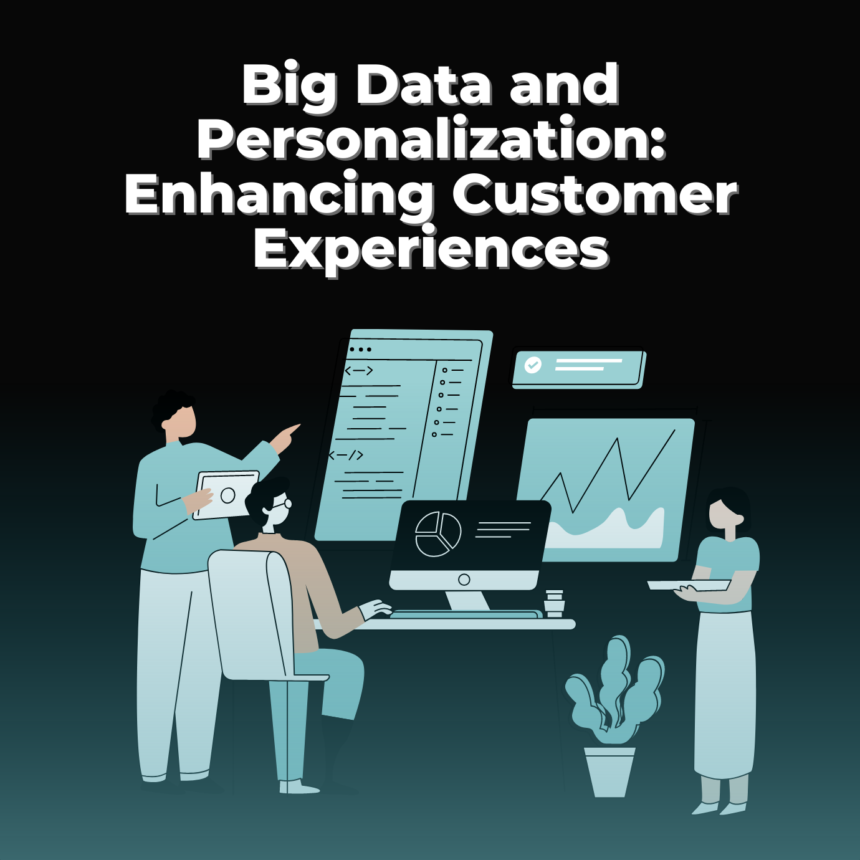In the age of digital transformation, organizations are increasingly leveraging big data to enhance customer experiences and drive customer-centric strategies. Big data analytics allows businesses to collect and analyze vast amounts of customer data, enabling personalized interactions, targeted marketing campaigns, and tailored product offerings. Let’s explore how big data is revolutionizing customer experiences through personalization:
1. Customer Insights and Segmentation: Big data analytics enables businesses to gain deep insights into customer behavior, preferences, and needs. By analyzing data from various sources such as transaction history, browsing patterns, and social media interactions, organizations can segment their customer base effectively. This segmentation allows businesses to understand customer segments better and develop personalized strategies for each segment.
2. Personalized Recommendations: Big data analytics powers personalized recommendations, which enhance the customer experience by suggesting products or services based on individual preferences. By analyzing customer data and using collaborative filtering techniques or recommendation algorithms, businesses can deliver targeted recommendations to customers, leading to increased engagement and higher conversion rates.
3. Tailored Marketing Campaigns: Big data analytics enables businesses to create highly targeted and personalized marketing campaigns. By leveraging customer data, businesses can deliver relevant content, offers, and promotions to individual customers based on their preferences and past interactions. This personalization in marketing campaigns leads to higher engagement, improved customer satisfaction, and increased conversion rates.
4. Dynamic Pricing: Big data analytics plays a crucial role in dynamic pricing, allowing businesses to adjust prices based on real-time market demand and customer behavior. By analyzing factors such as customer purchasing history, competitor pricing, and market trends, organizations can optimize pricing strategies to maximize revenue while remaining competitive. Dynamic pricing ensures customers receive fair and personalized pricing based on their specific context.
5. Omnichannel Experience: Big data analytics enables businesses to provide a seamless omnichannel experience to customers. By integrating data from various touchpoints, such as websites, mobile apps, social media, and physical stores, organizations can gain a comprehensive view of the customer journey. This allows businesses to deliver consistent and personalized experiences across channels, ensuring a smooth and cohesive customer journey.
6. Customer Service and Support: Big data analytics empowers businesses to deliver superior customer service and support. By analyzing customer interactions, feedback, and sentiment analysis, organizations can identify areas for improvement and proactively address customer issues. This personalization in customer service leads to faster response times, personalized solutions, and increased customer satisfaction.
7. Predictive Customer Analytics: Big data analytics enables predictive customer analytics, allowing businesses to anticipate customer needs and behavior. By applying machine learning and predictive modeling techniques to customer data, organizations can identify patterns, predict customer churn, and proactively address customer concerns. This enables businesses to offer personalized solutions and retain valuable customers.
8. Product Innovation: Big data analytics drives product innovation by providing valuable insights into customer preferences and market trends. By analyzing customer feedback, user-generated content, and market research data, organizations can identify gaps in the market and develop products that meet specific customer needs. This personalization in product innovation leads to increased customer satisfaction and market success.
9. Continuous Improvement: Big data analytics facilitates continuous improvement by providing real-time feedback and insights. By monitoring and analyzing customer data, businesses can track the effectiveness of personalized strategies and make data-driven adjustments to improve customer experiences continuously. This iterative approach helps organizations stay aligned with customer expectations and evolving market trends.
10. Data Privacy and Trust: While utilizing big data for personalization, organizations must prioritize data privacy and build trust with customers. Implement robust data privacy measures, ensure compliance with data protection regulations, and provide transparency regarding data collection and usage. By respecting customer privacy and demonstrating ethical data practices, organizations can foster trust and strengthen customer relationships.
By leveraging big data analytics for personalization, organizations
can significantly enhance customer experiences. From personalized recommendations and tailored marketing campaigns to dynamic pricing and predictive customer analytics, big data enables businesses to deliver relevant and engaging experiences at every touchpoint. By understanding customer preferences and anticipating their needs, organizations can foster long-term customer loyalty, drive customer satisfaction, and ultimately achieve sustainable growth in today’s competitive landscape.
